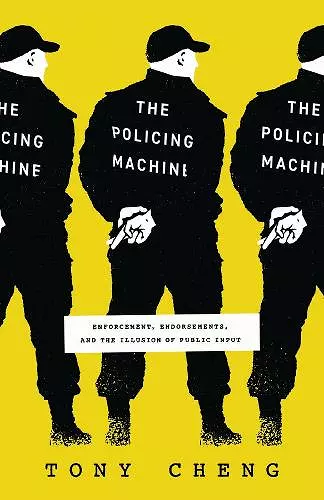The Policing Machine
Enforcement, Endorsements, and the Illusion of Public Input
Format:Paperback
Publisher:The University of Chicago Press
Published:9th Jan '24
Should be back in stock very soon

A revelatory look at how the NYPD has resisted change through strategic and selective community engagement.
The past few years have seen Americans express passionate demands for police transformation. But even as discussion of no-knock warrants, chokeholds, and body cameras has exploded, any changes to police procedures have only led to the same outcomes. Despite calls for increased accountability, police departments have successfully stonewalled change.
In The Policing Machine, Tony Cheng reveals the stages of that resistance, offering a close look at the deep engagement strategies that NYPD precincts have developed with only subsets of the community in order to counter any truly meaningful, democratic oversight. Cheng spent nearly two years in an unprecedented effort to understand the who and how of police-community relationship building in New York City, documenting the many ways the police strategically distributed power and privilege within the community to increase their own public legitimacy without sacrificing their organizational independence. By setting up community councils that are conveniently run by police allies, handing out favors to local churches that will promote the police to their parishioners, and offering additional support to institutions friendly to the police, the NYPD, like police departments all over the country, cultivates political capital through a strategic politics that involves distributing public resources, offering regulatory leniency, and deploying coercive force. The fundamental challenge with police-community relationships, Cheng shows, is not to build them. It is that they already exist and are motivated by a machinery designed to stymie reform.
“A brilliant analysis of the mechanisms the NYPD uses to cultivate political power. If Skogan and Hartnett’s Community Policing, Chicago Style was the must-read book on neighborhood policing of the twentieth century, I predict Cheng’s contribution will be the must-read book on the topic of the twenty-first." -- Tracey Meares, Yale University
“The Policing Machine shows that the public acceptance of police is not an inevitability created by lack of alternatives for public safety, but the product of a complex apparatus of consent and coercion that helps constitute the very public police purport to serve and protect.” -- Jonathan Simon, UC Berkeley
"The Policing Machine is the most important study of policing I’ve ever read. It applies a crucial relational and institutional analysis of community policing in New York City from an independent perspective. Cheng’s emphasis on de-monopolizing policing’s role in public safety offers a useful way forward for anyone seeking to bring serious change to city approaches to public safety." -- Robert Vargas, University of Chicago
"This title about police departments will appeal to concerned citizens and policy makers." * Library Journal *
"A hard-hitting exposé of the organizational structures and political maneuvering that thwart police reform." * Kirkus Reviews *
"Cheng’s book is a sharp and well-documented attempt to unveil the specific mechanisms by which the NYPD selects local input that is functional to its organisational purposes." * LSE Review of Books *
"A comprehensive illustration of the mechanisms that the NYPD uses to cultivate political power." * Punishment & Society *
"The Policing Machine is a well-organized, clearly written, and compelling study that should change how urban and political sociologists think about political mobilization, civic participation and association, and the consequences of policing for American society. Cheng shows that many of the plaudits that police receive, including active endorsements for a job well done and the appearance of buy-in through participation in dialogue, are confections, manufactured for public approbation. This raises important questions about the institutional legitimacy of one of the most well-resourced agencies of local governance in the country." * American Journal of Sociology *
"In The Policing Machine: Enforcement, Endorsements, and the Illusion of Public Input, Cheng expands our understanding of how police resist change. Cheng’s research focuses on the NYPD and utilizes ethnographic data, interviews, and public records collected over the course of 18 months of fieldwork. Scholars have noted how police function as political actors through police unions and groups like the Fraternal Order of Police (FOP) who work to lobby on behalf of police and influence electoral politics. Cheng takes a different approach by centering police as key local political actors and reveals the mechanisms through which the police maintain legitimacy and avoid making changes even in cases where there is significant pressure from both above and below." * Sociology of Race and Ethnicity *
"By studying the Policing Machine from the outside, Cheng brings into sharp focus this machinery for processing raw, polarized public input into a facade of public support for police." * Contemporary Sociology *
"For its wide-ranging and pioneering contributions, The Policing Machine should be mandatory reading for activists and city officials, as well as scholars studying cities, law, organizations, politics, and punishment." * Law & Society Review *
"A sobering corrective. Cheng centers an important caution: police-community relations are not a mechanism of institutional change; they are strategically deployed by police departments to resist change and reinscribe police power. Cheng illustrates through a study of the New York Police Department’s (NYPD) Neighborhood Policing program in two Brooklyn police precincts, combining eighteen months of fieldwork with creative analyses of public materials, social media posts, and other sources. He finds that the police resist transformation through the policing machine. . . [which] empowers segments of the 'community' that support the scope and services of the police, and it limits the capacity of groups calling for police accountability and the redistribution of state power in light of violent and race-based policing. . . . The policing machine offers a framework for understanding how police engage in maintaining the boundaries of the profession." * Law & Social Inquiry *
ISBN: 9780226830650
Dimensions: 216mm x 140mm x 18mm
Weight: 313g
240 pages